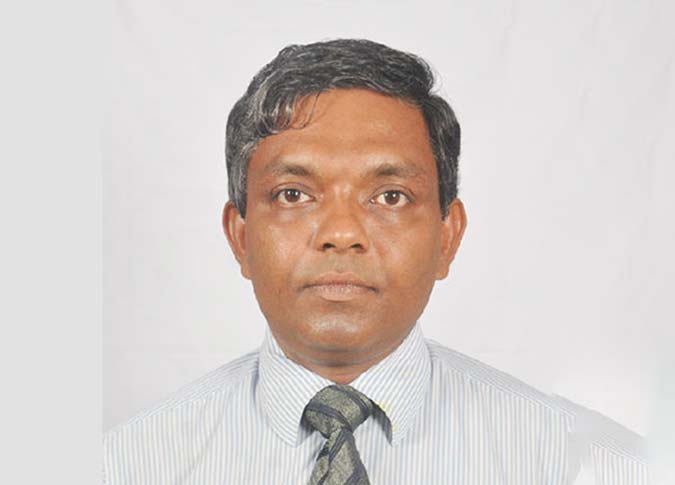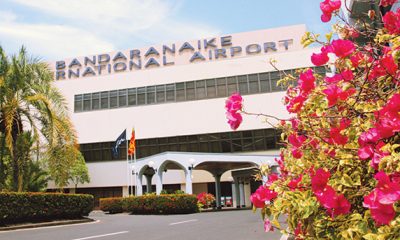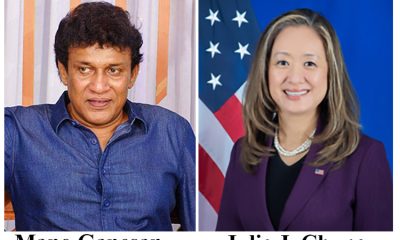News
Prof. Dunusinghe debunks govt.’s claims about stabilising economy

By Rathindra Kuruwita
Until Sri Lanka has access to international money markets, which will allow it to ensure there are no short-term dollar shortages, relaxing the restrictions on vehicle imports is out of the question, Professor in Economics at the Department of Economics at Colombo University, Dr. Priyanga Dunusinghe, said.
Even then, relaxing vehicle imports should be done in a slow and methodical manner, he said.
“A lot of people ask me whether I can give a date when this could be. However, giving a timeline is difficult because we have not yet managed to restructure our international debt. The government says this can be done in the middle of the year. Once the government manages that, we will have access to bilateral credit. After a while, we might be able to slowly relax restrictions on imports.”
Prof. Dunusinghe said people must not expect our economy to return to 2018 levels, soon after foreign debt is restructured.
He added that even if the government succeeds in foreign debt restructuring, it is improbable that the rupee will strengthen. It is likely that the rupee will hover around the current rates or be in a slightly depreciated state.
“We see increased economic activity, and with this, the demand for imports will rise. However, given that market mechanisms govern the exchange rate, I don’t see large fluctuations.”
Even with recent hikes, the tax revenue of the government is not adequate to cover the expenses. When the daily revenue is about 11 billion rupees, the daily expenditure is around 19 billion rupees, he said.
“The government needs to reduce its expenditure. It should also take steps to collect the taxes it can. The government says it has stabilised the economy, but many fear that it’s not a ‘stabilisation’ that can lead to growth in the medium term.”
Prof. Dunusinghe said Sri Lankans see Ministers still enjoying perks. They have not reduced their expenditure. There are also many issues with the procurement process.
Recently, Verite Research issued a report, and they said Sri Lanka’s procurement guidelines don’t allow for blacklisting contractors/suppliers involved in fraud and corruption, and the compliance gap is shown by the failure to maintan a blacklist for defaulting contractors.
“We are the only South Asian country that doesn’t blacklist contractors/suppliers involved in fraud and corruption. There are so many instances where companies provide low-quality goods to government agencies. We see so many substandard constructions. Things are increasingly getting worse. Companies make profit by selling a 100-rupee item at 250 to the government and make profit. How can the government reduce expenditures like this? If we make the procurement process transparent, a lot of waste can be reduced.”
Prof. Dunusinghe said corruption and bribery have to be stopped for the country to go forward. Government, as well as senior bureaucrats, have a significant role to play.
He added that Sri Lanka has a great potential for tourism. However, the country should be mindful that the industry seems to face extremely challenging situations once every three to four years.
“This is like a bubble that can burst. We should focus on tourism, but we must also focus on boosting exports. Remittances are also important, but overdependence on them becomes a curse. In recent years, we have become increasingly dependent on remittances and tourism, and we don’t focus on anything else. We don’t think about boosting exports. We send our youth and professionals abroad, hoping they will send a lot of money. This is how we plan on running our economy. Let me be clear: no country has developed from remittances.”
Prof. Dunusinghe said a strong export sector, based on correct Foreign Direct investment (FDI), is the path for development for Sri Lanka.
“Depending on tourism alone is also very risky. We need to diversify,” he said.
News
US sports envoys to Lanka to champion youth development

The U.S. Embassy in Colombo welcomed the U.S. Sports Envoys to Sri Lanka, former National Basketball Association (NBA) and Women’s National Basketball Association (WNBA) players Stephen Howard and Astou Ndiaye, from June 8 through 14.
The Public Diplomacy section of the U.S. Embassy said that it would launch a weeklong basketball program intended to harness the unifying power of sports, made possible through collaboration with Foundation of Goodness and IImpact Hoop Lab.
While in Sri Lanka, Howard and Ndiaye, both retired professional basketball players, will conduct a weeklong program, Hoops for Hope: Bridging Borders through Basketball. The Sports Envoys will lead basketball clinics and exhibition matches and engage in leadership sessions in Colombo and Southern Province for youth aged 14-18 from Northern, Uva, Eastern and Western Provinces, offering skills and leadership training both on and off the court. The U.S. Envoys will also share their expertise with the Sri Lanka Basketball Federation, national coaches, and players, furthering the development of basketball in the country. Beyond the clinics, they will collaborate with Sri Lankan schoolchildren to take part in a community service project in the Colombo area.
“We are so proud to welcome Stephen and Astou as our Sports Envoys to Sri Lanka, to build on the strong people-to-people connections between the United States and Sri Lanka,” said U.S. Ambassador Julie Chung. “The lessons that will be shared by our Sports Envoys – communication, teamwork, resilience, inclusion, and conflict resolution – are essential for leadership development, community building, equality, and peace. The U.S. Sports Envoy program is a testament to our belief that sports can be a powerful tool in promoting peace and unity.”
News
Rahuman questions sudden cancellation of leave of CEB employees

SJB Colombo District MP Mujibur Rahuman in parliament demanded to know from the government the reasons for CEB suspending the leave of all its employees until further notice from Thursday.
MP Rahuman said that the CEB has got an acting General Manager anew and the latter yesterday morning issued a circular suspending leave of all CEB employees with immediate effect until further notice.
“We demand that Minister Kanchana Wijesekera should explain this to the House. This circular was issued while this debate on the new Electricity Amendment Bill was pending. There are many who oppose this Bill. The Minister must tell parliament the reason for the urge to cancel the leave of CEB employees,” the MP said.However, Speaker Mahinda Yapa Abeywardena prevented Minister Wijesekera responding to the query and said that the matter raised by MP Rahuman was not relevant.
News
CIPM successfully concludes 8th Annual Symposium

The Chartered Institute of Personnel Management (CIPM) successfully concluded the 8th Annual CIPM Symposium, which took place on 31st May 2024. Themed “Nurturing the Human Element—Redefining HRM in a Rapidly Changing World,” the symposium underscored the pivotal role of human resource management (HRM) in today’s dynamic global landscape. Since its inception in 1959, CIPM has been dedicated to advancing the HR profession through education, professional development, and advocacy, solidifying its position as Sri Lanka’s leading professional body for HRM.
Ken Vijayakumar, the President of the CIPM, graced the occasion as the chief guest. The symposium commenced with the welcome address by the Chairperson, Prof. Arosha Adikaram, followed by the Web Launch of the Symposium Proceedings and Abstract Book by the CIPM President. The event featured distinguished addresses, including a speech by Chief Guest Ken Vijayakumar, President of CIPM, and an address by Guest of Honor Shakthi Ranatunga, Chief Operating Officer of MAS Holdings Pvt. Ltd., Sri Lanka.
The symposium also featured an inspiring keynote address by Prof. Mario Fernando, Professor of Management and Director of the Centre for Cross Cultural Management (CCCM) at the University of Wollongong, Australia.
Vote of Thanks of the inauguration session was delivered by Dr. Dillanjani Weeratunga, Symposium Co-chair.
The symposium served as a comprehensive platform for researchers to present their findings across a wide range of critical topics in HRM. These included Cultural Diversity and Inclusion, Talent Development and Retention, Ethical Leadership and Corporate Social Responsibility, Adapting to Technological Advancements, Mental Health and Well-being at Work, Global Workforce Challenges, Employee Empowerment, and Reskilling and Upskilling.
The plenary session was led by Prof. Wasantha Rajapakse. Certificates were awarded to the best paper presenters during the valedictory session, followed by a vote of thanks delivered by Kamani Perera, Manager of Research and Development.
The annual symposium of CIPM was a truly inclusive event, attracting a diverse audience that spanned undergraduates, graduates, working professionals, research scholars and lecturers. This widespread interest highlights the symposium’s significance in the field of HRM, offering a unique opportunity for everyone to network and learn from scholarly brains.The CIPM International Research Symposium was sponsored by Hambantota International Port, Sri Lanka Institute of Information Technology (SLIIT), E B Creasy & Co. PLC, and Print Xcel Company.
























